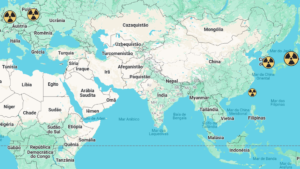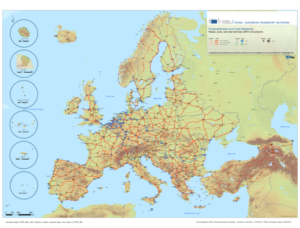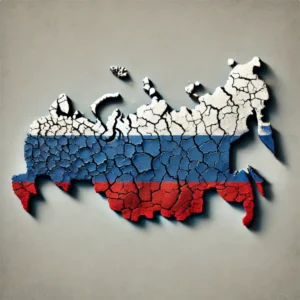- ESSI emerged as a response to the need to strengthen air defense in Europe;
- The escalation of Moscow’s attacks on Kiev has motivated neighboring and allied countries to strengthen their defense capabilities and security cooperation;
- The formation of this alliance jeopardizes the MAD (Mutual Assured Destruction) strategy of the Cold War era.
As airborne threats become increasingly complex and challenging, the creation of the German-led “European Air Shield Initiative” assumes significant geopolitical importance in protecting Europe against ballistic missiles, cruise missiles or even long-range drones.
The creation of the ESSI was spurred by the escalation of the war in Ukraine, raising concerns in other European countries regarding their own security.
In the face of these challenges, it is essential to strike a balance between international cooperation and European security to ensure the effective defense of European airspace and the protection of countries against air threats.

What is the European Sky Shield Initiative – ESSI – “European Air Shield Initiative”
The European Sky Shield Initiative (ESSI) is an initiative led by Germany and other European countries, which seeks to strengthen the air defense and security of European airspace.
Launched in August 2022, ESSI emerged as a response to the need to strengthen air defense in Europe and concentrate efforts in this area. Its objective is to promote the cooperation and interoperability of the air defense systems of the participating countries, aiming at an effective defense against air threats.
In addition, the initiative seeks to improve surveillance, monitoring and control of European airspace, as well as the ability to respond to possible attacks or threats, through the use of advanced technologies, integrated air defense systems and improved coordination between the air forces of the countries involved.
Therefore, the initiative was designed to promote a collective and shared defense of European airspace, allowing a more efficient response in crisis or threat situations.
The creation of ESSI in the context of the war in Ukraine
Russia’s violent military offensive has led other European countries to worry about their own security. The constant and almost daily missile attacks by Moscow against the territory of Ukraine has motivated neighboring and allied countries to strengthen their defense capabilities and cooperation in security and air defense to try to intercept missiles and drones in potential future military attacks like those from Moscow.
The signing of the letter of intent to join the ESSI in October 2022 was attended by NATO Deputy Secretary General Mircea Geoană, who highlighted the importance of commitment in the face of indiscriminate attacks by Russia, highlighting Germany’s leadership in launching of the Initiative.
He also highlighted that the initiative will leverage NATO’s existing cooperation structure to defend member states against missile threats, providing interoperable assets integrated into the alliance’s air and anti-missile defense system.
How “neutral” countries like Switzerland and Austria are willing to participate in the military defense initiative
Switzerland and Austria, two countries known for their policy of neutrality, are facing challenges in the current geopolitical scenario due to the Ukrainian conflict taking place not far from their borders.
Switzerland has as one of its distinguishing features its “neutral” status, which was established in the Treaty of Paris in 1815.
Switzerland’s policy of neutrality is founded on the principle of non-involvement in armed conflicts between other states. This means that the country does not allow its territory to be used for war purposes by other countries.
However, the current war between Russia and Ukraine, which takes place in the heart of Europe, has raised questions about the viability of maintaining its traditional neutrality.
Switzerland’s participation in the European Initiative indicates a move towards a more cooperative approach to collective security.
Although Switzerland is not a member of NATO, which requires mutual action and assistance in times of war, there is an ongoing internal debate about the country’s role in protecting its own security in an ever-changing geopolitical context.
An example of this was in March 2023, when Germany asked Switzerland to sell Leopard 2 tanks to increase military support to Ukraine. However, Switzerland declined the offer.
This decision reflects Switzerland’s delicate position regarding its neutrality, but also highlights that the country has taken measures that go beyond the traditional principles of neutrality.
This can be exemplified by Switzerland’s adherence to many of the European Union’s sanctions against Russia, even though the Alpine country is not part of the EU itself.
Austria, another country known for its policy of neutrality, is also facing a foreign policy test.
Austrian Prime Minister Karl Nehammer said precautions needed to be taken to protect the country against the risk of drone and missile attacks, a threat that has increased considerably.
Although Austria has been a member of the European Union since 1995, the government emphasizes that this decision does not compromise its neutrality. The Austrian Minister of Defence, Klaudia Tanner, considered this movement an important step in the country’s history.
Therefore, the participation of these countries in the ESSI, open to collaborating with other nations in the area of defense, demonstrates a pragmatic response to the needs of an evolving security and a paradigm shift in the European security system, which we will talk about below.
The debate about the origin of anti-aircraft missile systems: only European systems or also American systems like the Patriot
As missiles and drones continue to terrorize Ukrainian cities, European leaders
find themselves in a heated debate over the best air defense systems to protect their own countries against future Russian air strikes.
Two lines of thought, led by France and Germany, emerged, each with its own distinct view on the best equipment, systems and timelines for development.
Germany argues that it is more efficient to invest in tried and tested anti-missile systems, such as those made in the United States, Israel and, of course, Germany. They believe these options offer a faster path to strengthening air defense capabilities.
That approach, led by Berlin, angered French President Emmanuel Macron, who saw reliance on non-European weapons such as the US medium-range Raytheon Patriot missiles and Israel Aerospace Industries’ Arrow-3 system for long-range interception as a threat to the concept of European strategic autonomy that he sought to achieve.
Macron argues that it is crucial to prioritize technology developed within Europe itself, including the Franco-Italian MAMBA air defense system.
In this dispute, other European nations such as Belgium, Hungary, Italy and Estonia have shown support for the French approach and are ready to adopt the European system.
It is clear that the interest of the French arms industry plays a significant role in this context, as Macron defends the need to boost the European arms industry, including the French industry, in order to guarantee the continent’s strategic autonomy.
As well as the European Defense Agency (EDA) and the European Development Unit (EDU) which are involved in the process of developing and coordinating these European air defense systems.
However, as France and Germany are locked in an ideological battle over the origin of air defense systems, some experts argue that it is critical to ensure that all systems can function harmoniously and in a coordinated way in practice.
Cooperation and interoperability between different systems is essential to address air threats and maximize the effectiveness of Europe’s collective defence.
Israel also plays a relevant role in this context, providing advanced air defense technology and systems. Its anti-missile systems have been admired for their efficiency, and Germany is considering acquiring them to strengthen its defense capabilities.
However, the pursuit of effective air defense requires a careful balance between adopting proven technologies and developing autonomous capabilities within Europe.
As European leaders continue the discussion on the best approach, the ultimate goal is to ensure the security and protection of European countries from airborne threats, in order to strengthen cooperation between nations and the continent’s defense industry.
The geopolitical importance of forming a European missile defense alliance with countries outside NATO and the European Union
In the current geopolitical context, the formation of a European missile defense alliance plays a crucial role in the security and stability of the region.
The system will be able to intercept air missiles, both conventional and nuclear, and establish an effective defense against possible threats from countries such as Russia, Iran and China.
However, this geopolitical approach carries with it both benefits and risks that need to be considered.
One theory that can be broken with the formation of this alliance is the MAD (Mutual Assured Destruction) strategy, which dates back to the Cold War era.
This doctrine implies that if one country launches a nuclear attack against another, the latter will be able to retaliate with an equally devastating response, resulting in the destruction of both. Therefore, the strategy has worked since the post 2nd World War, where both are trying to avoid the worst of consequences: nuclear annihilation.
However, if a country or a bloc has an anti-missile system, it is possible that there will be a break in the system of Mutual Assured Destruction, since destruction is no longer assured. If a country has such air defense, it increases the risk of a second country – possessing nuclear weapons – of using these weapons.
But at the same time, it would be almost impossible at the present time for a nuclear country to have such an efficient missile system that it would be able to intercept 100% of all nuclear missiles in a counterattack, covering the entire Nuclear Triad. Especially, those launched by nuclear submarines which are even more difficult to locate and known as SLBM’s.
Under analysis, in the near future, it is possible that countries with cutting-edge technology and that invest heavily in defense can envision a future “super missile system” using Artificial Intelligence (AI) and creating a super shield that 100% protects a country or region. This technology would potentially elevate defense systems globally and heavily impact the MAD and geopolitics.
However, currently, by sending a clear message that enemy missiles will be intercepted in European territory, there is a possibility that countries like Russia will choose to risk the use of nuclear missiles in a war situation.
The biggest risk of this hypothesis is the lack of guarantees of success in intercepting all incoming missiles. Even if some nuclear missiles are intercepted, the resulting explosion and the waste generated can cause significant damage and serious consequences.
Therefore, the formation of this European missile defense alliance requires a careful approach.
The other geopolitical importance of the development of the ESSI is the paradigm shift in the European security system.
This paradigm shift caused by Russian aggression against Ukraine has led 4 European countries that were previously neutral to align themselves legally or de facto with other countries in its security. Finland and Sweden seeking legal association with NATO and Switzerland and Austria with the European Air Shield.
The ESSI is an example of how Russia’s invasion of Ukraine was a major strategic defeat by Moscow that aimed to divide the European continent and failed. Now it is to be seen whether Putin’s strategic defeat in Ukraine will be coupled with a military defeat as well.








[…] Weimar Triangle Regional Alliance is an informal coalition that brings together France, Germany, and Poland in a strategic partnership to promote cooperation and policy coordination on issues of […]